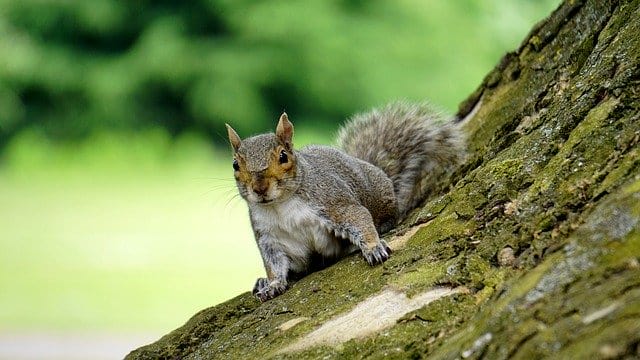Humans have the privilege of air conditioning. We can hide from the sweltering heat that is outdoors by staying in our homes or public spaces. But what about the animals? What do squirrels do during a heatwave? Heatwaves do have an effect on squirrels, and they risk sending them to your house for relief. An air-conditioned house, however, is no place for a squirrel. For quick and effective squirrel removal, call Pest Control Kitchener now.
Squirrels are wild rodents that naturally live in trees. As mammals, they regulate their body temperature internally. This means that, like us, they shiver when they are cold, and sweat when they are hot. Squirrels have sweat glands between the pads of their feet and in between their toes. Their tails also help to cool them down as the air surrounding their tails cools their blood before it is pumped back into the cores of their bodies. Squirrels also regulate their body temperature through respiration. They have higher body temperatures than we do, but like other mammals, squirrels can get too hot and this makes them sluggish and tired. During a heatwave, squirrels will usually hide in the shade where it is cooler.
So, heatwaves do have an effect on squirrels. And, like us, they would rather beat the heat with some quality air conditioning. This unfortunately makes human homes attractive to squirrels. They can feel the cool air that escapes the roof vents of our homes. To get inside, squirrels will look for a weak spot somewhere on the exterior of the house and chew their way in if they need to. As rodents, squirrels’ teeth are very tough – they can chew through practically anything. Roof vents, drip edges, soffits, and chimneys are common entry points.
Squirrels like to nest in attics. They often build their nests in the insulation of the roof where it is comfortable and safe from predators. This however damages the quality of the roof and increases energy costs as the animals shift and crush the insulation around. What’s worse is that squirrels use parts of their nests as latrines; they will urinate and defecate inside the walls of the home, causing odour problems, mold, and rot. The smell of squirrels also risks attracting other pests to the home, like raccoons. Having squirrels in the house increases the risk of fire, too, as the animals like to chew on electrical wires.
Squirrels need refuge from the heat, but you should not welcome them into your home. Leave dishes of water out on your property, and plant lots of trees and shrubs instead. If you think there are squirrels in your home, the best thing you can do is get professional help. A licensed wildlife removal technician will safely remove the squirrels from your home without harming them. Call Pest Control Kitchener for quality squirrel removal and pest proofing services: 226-778-3098.

